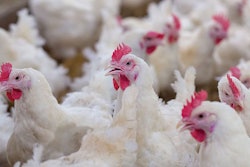
People for the Ethical Treatment of Animals (PETA) recently came out with a billboard in Portland, Oregon, that reads, “Face It — You Can’t Claim to Be a Feminist and Still Eat Eggs.” The ad further explains that eating eggs and dairy is supporting the abuse of females.
“Portland is a city with strong women and thoughtful students, which makes it the perfect place to point out that the egg and dairy industries are built on sexual exploitation,” says PETA Executive Vice President Tracy Reiman in a PETA press release. She further explained her feelings that female bodies are violated so that human consumers can steal what belongs to the animals.
The press release says that, because of the 300 eggs per year that hens are “forced” to lay, they suffer “osteoporosis, cysts, infections, ovarian carcinomas, and reproductive tumors — and eggs can even become lodged inside them.”
It is no secret that PETA likes to get its message across by stepping on the heart strings of what it thinks matters to people. In my opinion, they are great at dramatizing and inaccurately describing the fundamentals of livestock production.
How can the agriculture industry fight back?
In a time when organizations like PETA have mastered their marketing campaigns to target the digitally advanced generations, it is more important than ever for the livestock industry to fight back and better educate the generation making buying decisions.
Although I grew up raising cattle, I went to a city school, which gives me the ability to personally attest to the fact that some people have no idea where their eggs and meat come from other than the store.
A Google Analytics expert recently said that, in 2017, people consumed almost all of their information online. Think about how scary that is for a minute: People are reading blogs or ad campaigns from organizations like PETA to get their food-buying information.
Consumers are genuinely confused and perhaps the agriculture industry is partially to blame for that. One could argue that marketing plans have taken advantage of their ignorance to promote product labels. Another could argue that consumers have become so removed from the farm that the producers’ messages are not reaching them at all.
WATT Global Media's "2018 Chicken Consumption Survey: What consumers want" explained that consumers are confused by chicken product packaging claims; it also indicated that consumers would purchase more chicken if they had more information about the product and that the package is the most desired source for information.
Identifying exactly what consumers know and want is crucial before poultry producers continue to make advances in generating a product that consumers may not be willing to pay the premium for.
I think agriculturalists, including myself, need to do a better job of taking to the internet to explain animal production. I think we need to start labeling conventional products with farm-based facts.
I hope that if or when our consumers better understand the amount of time, effort and heart that goes into animal production that they would stop buying into animal activist campaigns. I think we need to make a better name for agriculture in big cities. Use billboards and app advertising to target people who are removed from the rural lifestyle. Maybe the agriculture industry needs to target feminists with a billboard that says, “Women farm to provide healthy food options to our sisters and children.”

















